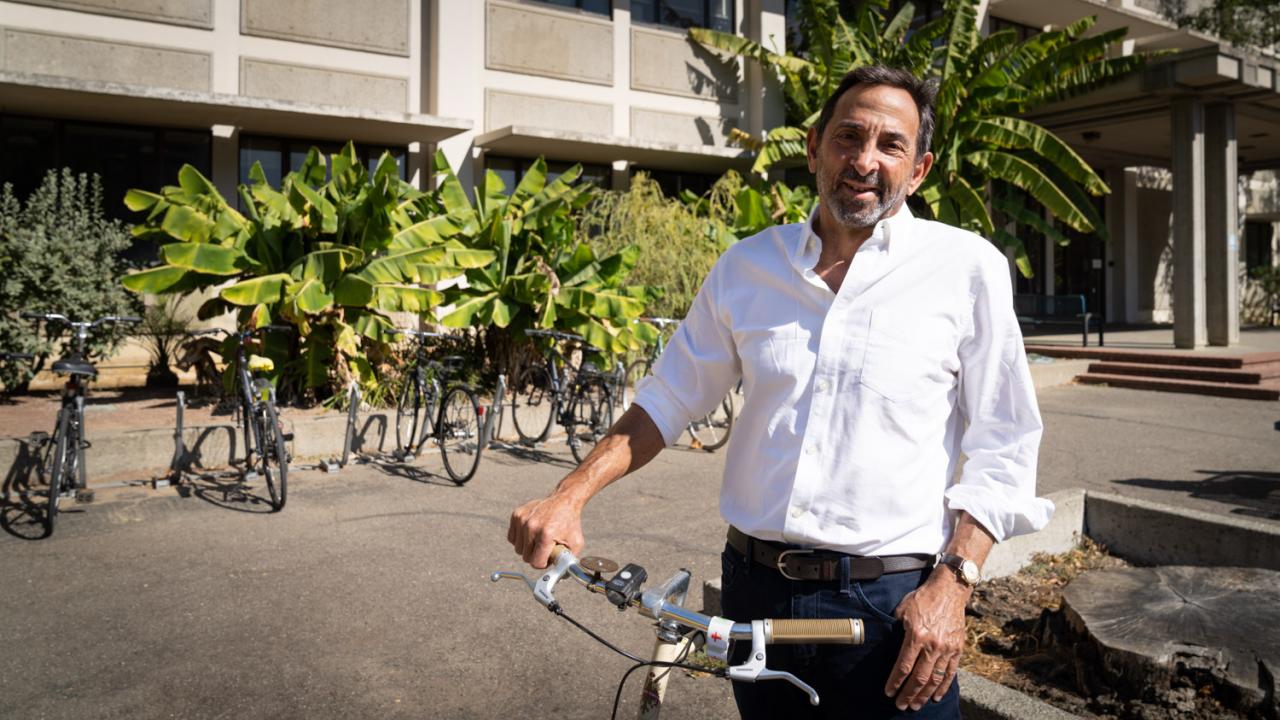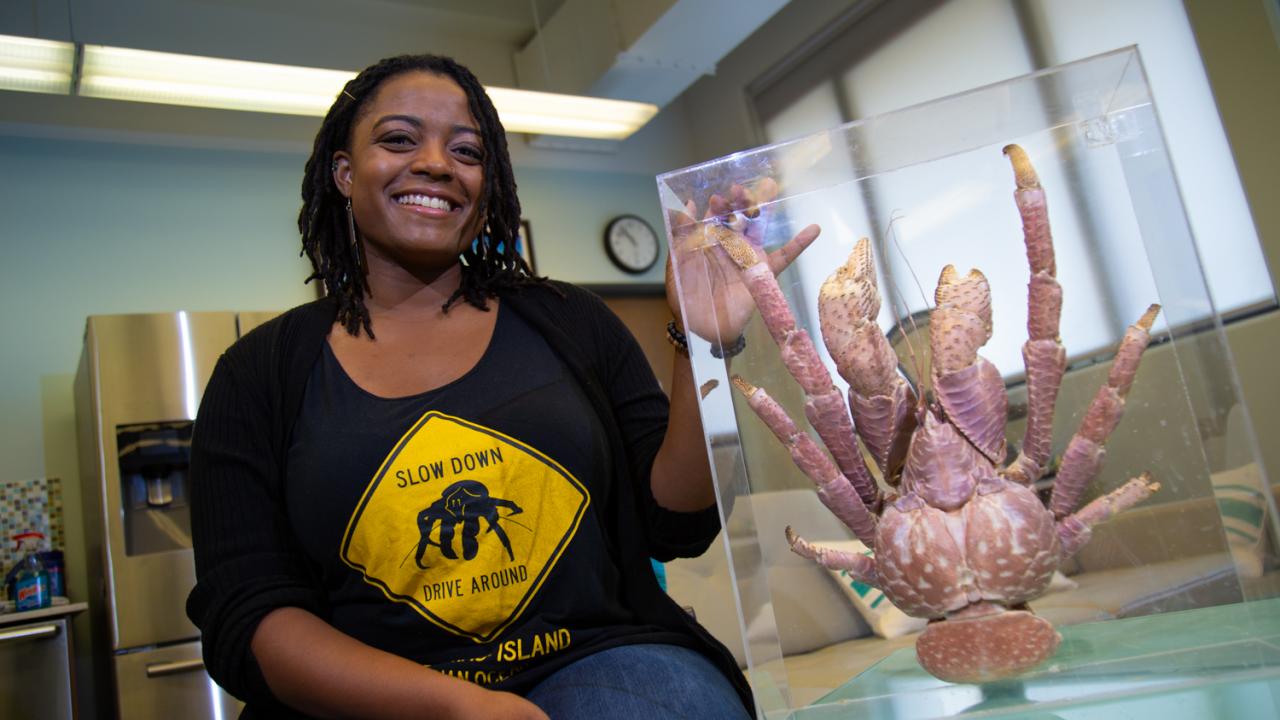
Discovering Curiosity: The Tug of the Tides with Coastal and Marine Sciences Institute Director Richard Grosberg
Quick Summary
- As director of CMSI, Richard Grosberg works with researchers to understand our coastal and marine systems
- Together, they educate the public and engage policymakers to sustain and restore the coastal environment in California and beyond
- Grosberg's research covers a broad spectrum of evolutionary biology topics, from the evolution of mating systems and parental care to how and why species adapt to rapidly changing marine environments
Sometimes after school, Richard Grosberg would ride his bike to the Santa Monica Pier from his home in West Los Angeles. He’d play at the penny arcade until his pockets were coinless and then would descend beneath the pier, where he’d spy on crabs, barnacles, mussels and sea stars. He’d swim in the surf and then return home.
For Grosberg, the ocean has been a continual source of fascination. Unlike land, it’s a place where the human body is out of its element.
“It’s not a natural environment for us to operate in and the fact that it’s kind of weird is actually what attracted me to the sea in the first place,” said Grosberg, a distinguished professor of evolution and ecology.
As director of the Coastal and Marine Sciences Institute, Grosberg oversees an interdisciplinary body that includes faculty, staff and students from the College of Biological Sciences, the College of Agricultural and Environmental Sciences, the College of Letters and Science, the College of Engineering, the School of Law, the School of Veterinary Medicine and the Graduate School of Management. Together, these researchers work to understand our coastal and marine systems, educate the public and engage policymakers to sustain and restore the coastal environment in California and beyond.
“We’re trying to improve the lot of humanity,” said Grosberg. “And that often, for people like me, is through bringing together diverse groups of colleagues to advance our understanding of natural and human systems, and sharing that information with our students, the public and policymakers”

Aquatic adaptations
Grosberg’s initial interest in the ocean wasn’t academic. He started college at UC Santa Cruz as an American Studies major, but a professor’s discouraging reaction to a term paper caused Grosberg to question his path.
The professor said “my whole premise for the term paper was deeply misguided,” said Grosberg. “So I thought, ‘Well, I guess I’m not going to do this.’”
Grosberg had never considered becoming a scientist, let alone a marine biologist. Sure, he bodysurfed and was enamored with the ocean, so much so that his mother encouraged him to become the next Jacques Cousteau. But Grosberg’s seafaring temperament was more like Charles Darwin’s—they both suffered from seasickness.
“I really knew nothing much about biology or evolution, but something clicked when we read 'Adaptation and Natural Selection: A Critique on Some Current Evolutionary Thought' by George C. Williams in a freshman seminar,” said Grosberg.
The book made Grosberg realize evolution by natural selection was one of humankind’s most important ideas. It resonated with him, evoking memories of the intertidal creatures he encountered throughout his youth.
“Until then, I never considered a career as a biologist, but I began to realize it might be the only thing I could do,” said Grosberg.
He signed up for classes like oceanography, paleontology, embryology and invertebrate biodiversity and started thinking more about the fundamental differences between marine ecosystems and land-based ecosystems.
“What are the implications for ecological and evolutionary processes that are different in the ocean than they are in land systems?” said Grosberg. “I’ve really devoted my career in various ways to trying to understand how ecological and evolutionary processes differ on land, in the air, and in the sea, and how marine organisms and their offspring move around oceans, how connected populations are and how capable and over what spatial and temporal scales marine organisms are able to adapt to variation in their biotic and physical environments.”
In the spring of 1974, Grosberg signed up for an immersive, research-intensive course called “Problems in Marine Biology,” which was run by the Bodega Marine Laboratory. The enrollment was a last-minute decision and as a result, Grosberg missed out on student housing. Instead, he found a cabin that belonged to former UC Davis Chancellor Emil Mrak.
That spring in the “Mrak Shack” sealed Grosberg’s fate and—though he didn’t know it at the time—would ultimately bring him to UC Davis.
In 1976, he graduated from UC Santa Cruz with a B.A. in Biology.

Deeply Darwinian
Grosberg was a biology Ph.D. student at Yale University when it first became possible to directly characterize genetic variation in populations of a species and how that variation changed in space and time.
“By the time that I got to graduate school in 1977, I was deeply devoted to Darwinism,” said Grosberg. “The revelation that individual differences, as they accumulate across generations through natural selection and other processes, can add up to all of the biodiversity on Earth since life first originated simply amazed me.”
Grosberg studied the genetic and developmental basis of individual variation and evolutionary change using marine invertebrates like sea squirts and hydroids, organisms that grow attached to docks and rocks. His research revealed broad divergence between individuals of the same species, not just for genes that controlled physical traits but for genes that directly controlled reproductive success.
The questions these colonial marine animals raised about variation, evolution and the origins of multicellular life became the foundation of Grosberg’s research program for the next few decades. He graduated with a Ph.D. in Biology in 1982.

Finding solutions for the planet and industry
Today, Grosberg, his students and postdoctoral fellows work across a broad spectrum of evolutionary biology, from the evolution of mating systems and parental care to sibling cannibalism and how and why species adapt to rapidly changing marine environments, among other topics.
“Most of the research in my lab concerns understanding the processes that generate, sustain and destroy biodiversity in marine, freshwater and terrestrial systems, and how those processes vary through time, space and across the major realms of life,” said Grosberg. “We study these processes from scales that range from genes to ecosystems, and using approaches that span genomics, population genetics, phylogenetics, developmental biology, ecology and paleontology.”

A Tradition of Terrestriality: Population Biology Ph.D. Student Victoria Morgan Journeys Among Land Crabs
In the lab of Richard Grosberg, Population Biology Ph.D. student Victoria Morgan studies the genetics of land crabs to understand how they adapted to living on land.
In addition to teaching and research, Grosberg leads the Coastal and Marine Sciences Institute, a community of internationally renowned colleagues who are solving the grand challenges of preserving and restoring the coastal systems that support so much of California’s (and the world’s) economy. One area of focus: sustainable seafood.
“To meet the demands for high-quality protein of a growing global population, and to do it sustainably, you need to engage aquaculturists and agronomists, hydrologists and oceanographers, climatologists and ecologists, engineers and economists, lawyers and policymakers, and producers and consumers,” said Grosberg. “As a land-grant university with a world-renowned marine lab and marine science and policy program as part of its portfolio, and with its culture of collaboration, UC Davis is in a better position than perhaps any other university in the world to link its justifiable fame in land-based agriculture and aquaculture with marine-based production.”
Groups like the Bodega Ocean Acidification Research project at CMSI are already on the case, working with businesses like the Hog Island Oyster Co. of Marshall, Calif. to figure out sustainable “economies of shell.”
![]()
Sea Change: UC Davis Explores the Future of Ocean Acidification
Beneath the sapphire waters of the Pacific shoreline, a pervasive threat to marine life grows. Human-produced carbon dioxide is altering the chemistry of the sea. To lead the future of climate change research, an interdisciplinary team of UC Davis scientists at the Bodega Marine Lab is collaborating to understand and confront an emergent global crisis.
“More and more ecologists and evolutionary biologists are committed to the kind of sustainability that is deeply rooted in science, that crosses disciplinary boundaries and that ensures environmental, economic, social and cultural vitality,” said Grosberg. “These links between policy needs and science motivate many of my colleagues to devote major parts of their research programs to that end.”

Disseminating this passion and knowledge for coastal systems and policy is also part of CMSI’s mission. In 2013, the institute launched the Marine and Coastal Science major, which now numbers more than 100 students.
When CMSI started, Grosberg and his colleagues hoped to build a community of education and discovery that engaged not just his faculty, but students, staff and the public. Those hopes are now a reality.
“The diverse array of passionate researchers and students working together to protect our oceans is beyond empowering,” said UC Davis alum Sarah Erickson, ’18 in Wildlife, Fish and Conservation Biology. “I couldn’t be more honored to be involved in this community.”
“We’re working together across the spectrum, in terms of research agendas but also engaging stakeholders—whether in the private sector, policymakers, foundations or environmental advocates—to work together to explore questions and broker solutions,” added Grosberg.
